All international students intending to apply for admission to FTMS College have to fulfil the entry qualification requirement for the programme interested in and fulfil the following requirements.
To complete an application form to be submitted together with all the following relevant documents:
- 10 copies of passport size photograph with white background.
- 3 sets of photocopy of your passport.(All pages including blank page).
- Recent Resume/CV (if applicable).
- Medical health examination report
- All academic certificates & results, including secondary and/or higher secondary school transcripts and certificate photocopies. And must be certified true copy.
- No Objection Certificate (NOC) – is required by the Ministry of Higher Education of Malaysia from students from Sub Sahara nations, must be signed by the appropriate authority in the country of origin. For Nigerian, Eligibility Letter is must
- WAEC / NECO scratch card is must for Nigerian
- Visa Processing Fee RM 2,500 for all programmes
Please include the Registration Fees with all registration documents. Remittances by electronic transfers should be evidenced by a clear copy of the bank confirmation advice and referenced with the student’s particulars: name, passport no., course and intake month and year.
Upon receiving all the required documents, offer Letters will be sent to successful applicants (please allow 1-2 weeks) and college will apply for a student visa on behalf of the applicant.
We advise that all application forms arrive eight (8) weeks before the intake date. Then, a copy of the approval letter from the Malaysia Immigration Department will be sent to the applicant.
The applicant will have to settle their course fee as instructed in the offer letter, before departing from their home country. Please refer to the payment instruction section for the payment method and information.
The application materials can be sent
to FTMS College at the following address:
Admission Unit, Marketing & Communication Department FTMS College, Lot No. 12159, Jalan Cyber Point 6, Cyber 8, 63000 Cyberjaya, Selangor, Malaysia.
All payment can be made through cash / cheque / on-line transfer / telegraphic transfer and please find below details of our account.
Company Name: FTMS College
Bank: CIMB Bank Berhad
A/c No.: 8000311446
Swift code: CIBBMYKL
General Admission Procedure For International Students
- Submissions of Documents
- Please refer to the Application Procedures section for updated information
- Letter of Offer
- Upon receiving the required documents, application fees and meeting the entry requirements, FTMS College will send the Conditional Offer Letter
- Await approvals from MOHE and Immigration Dept
- FTMS College will submit the qualifications to the Ministry of Higher Education (MOHE) for further approval. May require about one (1) week.
- Upon approval by MOHE, the application will be sent to the Malaysian Immigration Department for the issuance of a Student Visa approval letter. May require another two (2) weeks.
- Applications to the MOHE and Immigration Dept about 2 months before the intake date. Reason is because approvals are valid for only 2 months.
- Remit initial payment for fees
- Upon approval of the Student Visa, student will be notified and the approval letter will be courier to the student by the counselor.
- Arrangements for airport pickup can then be made for arrival in Malaysia.
- As a pre-condition for airport pick up, student are require to settle their course fees as per instructed in the offer letter.
- Please refer to the Payment Instuction page for details.
General Information
- The issuance of Student Visa Approval Letter by the Malaysian Immigration Department can take up to 2 month. Please take note that it is the prerogative of the Malaysian Immigration Department to approve or reject any visa application.
- Students are responsible to check with the Malaysian Embassy in their country regarding any special requirements or visa requirements before coming to Malaysia. For example, the student may need to apply for a Single-Entry Visa to enter Malaysia, in order to avoid a fine or being turned away at the airport.
- Students from yellow fever endemic areas (e.g. Africa, Central and South America) are required to take the necessary inoculations before coming to Malaysia. The Medical Certificate will be verified by the Health & Quarantine officers at the Airport.
Climate
Malaysia is generally warm throughout the year with temperatures ranging from 21° to 32° Celsius in the lowlands. This can however be as low as 16° Celsius in the highlands. Annual rainfall is heavy at 2,500mm (100 inches).
People
Malaysia has a population of about 22 million. It is a multi-racial country whose social integration has become a model for the rest of the world. Almost 80% of the total population occupy the Peninsular. There are three main races in the country. The Malays, who are Muslims, form the majority in the country.
The other two main racial groups are the Chinese, who are mostly Buddhists and the Indians, who are mainly Hindus. Others who make up the population include the Eurasians and the more than 50 indigenous groups from Sabah and Sarawak like the Kadazans, Dusuns, Muruts, Ibans, Orang Ulu, Melanau, Bidayuhs, Penans, just to name a few. The different races have their own traditions and customs which gives Malaysia a colourful heritage. The important festivals of each race is a public holiday in the country (so there are a lot of public holidays here!) and celebrated by all regardless of race and beliefs.
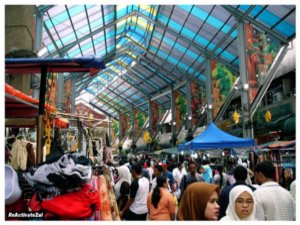
Expenses in Malaysia
Living in Malaysia is far cheaper than most Western countries and some other Asian countries such as Japan, Hong Kong and Singapore. Housing, communications, transport (including taxis), local food, holiday accommodation, airfares, clothing, medical expenses, entertainment and recreation are cheaper than most expats have experienced.
Prices for groceries are also fairly reasonable, depending on where you shop. Malaysia has many supermarkets and hypermarkets and you can also buy food at the various outdoor markets at very attractive prices. As an example the current estimate on basic items are about RM3 for a loaf of bread, RM3 to RM4 for a litre of milk, about RM50 to RM95 for a kilogram of premium imported steak. To know more about the exchange rates based in your home currency, please visit www.oanda.com/convert/classic Item Cost per month
Item Cost per month
*Please note that the average estimates were derived based on prices as at April 2004 and they serve as a reference only.
| Accommodation | RM300 – RM1,500(rental varies with geographical area, type of accommodation, demand, facilities provided and the number of people sharing) |
| Ultilities | RM50 – RM80 (not applicable for boarding schools) |
| Food | RM300 -RM450 (Based on RM10-RM15 a day for 3 meals)Note: Included in boarding fees, Boarding Schools usually provide two meals a day. Not included in room rates, Halls of Residence normally offer meals at extra charge. |
| Public Transport | RM20 – RM100 (varies with types of student concession pass) |
| Telecommunications | From RM30 (varies with usage and promotional packages subscribed) |
| Books & Stationery | RM30 – RM100 (varies with course) |
| Personal expenses | RM100 – RM200 (varies with individuals)(clothes, toiletries, entertainment, haircut, miscellaneous) |
Transport
Malaysia has well-developed air and sea connections. It is also accessible by road and rail through Thailand and Singapore on the Peninsular. More than 25 major airlines service the international airports throughout the nation. Port Klang and Penang in the Straits of Malacca link the country to the rest of the world by sea.
Internal travel is relatively easy, comfortable and cheap. The major towns and cities are served by air-conditioned trains and buses and also by regular scheduled flights. Travelling by road in Peninsular Malaysia is popular as it has a well-developed network of roads.
In Sabah and Sarawak, travelling by four-wheel drive is recommended on unpaved roads, and many remote areas can only be reached by air or river boats. Travelling by rail is also highly recommended as you get a panoramic view of the countryside. To get value for money when travelling by rail, plan your journey in advance. Entertainment

Kasturi Walk
Tantalise your tastebuds with authentic Malay kuih, Chinese dim sum or delicious Indian rojak. Or better still, indulge in some durian pancakes, made from the king of fruits! Discover what Malaysia tastes like with plenty of local snacks and specialties specially selected for Kasturi Walk. Here you will also find an array of traditional garments and souvenirs.
Kasturi Walk is a transformation of Lorong Kasturi, a lane running alongside Central Market. Opening very soon, Kasturi Walk is an exciting covered walkway of retail and F&B kiosks, attracting visitors and shoppers to its vibrant al fresco ambience.
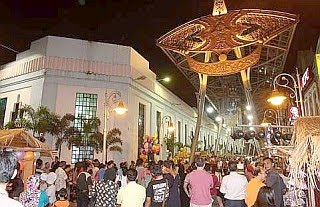
Kampung Baru
Kampung Bahru is the oldest Malay residential area in Kuala Lumpur. About ten minutes away from Chow Kit Market, it was founded in 1899 and there are still authentic traditional Malay wooden houses there. On Saturday evenings, one section of Kampung Bahru is a hive of activity.
This market has a totally Malay feel to it, and this is obvious in the style of jewellery and clothes, in the type of fabric, the varied tastes of Malay cooking and in the make of the handicraft on sale.
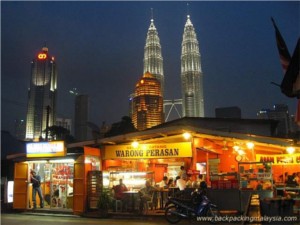
Little India
Little India is a riot of colours, from the saris hanging from shops to the snacks and sweetmeats on sale from roadside stalls. Find fresh milk, various Indian breads and delicious mouth-watering fare from the numerous eateries. What better opportunity to sample Indian cuisine at really affordable prices.
KL’s Little India is to be found in the older section of the city on Jalan Tunku Abdul Rahman. Jalan Masjid India is the main street of Little India and the whole place is delightfully reminiscent of a Middle Eastern bazaar with the arrangement of its shops and items on sale.
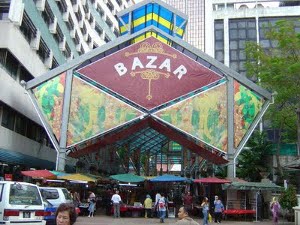
Chinatown
Every major city in the world has a Chinatown, as does Kuala Lumpur, BUT there is a unique difference to KL’s Chinatown, one that is reflective of the multi-racial harmony of Malaysia.
Chinatown it is, indeed, but at its very heart sits the Sri Maha Mariamman Indian temple. Colourful statues and sweet scents greet visitors, and the bright hues of flower garlands hanging from flower stalls do much to brighten the vista.
Equally colourful are the mountains of Indian sweetmeats and delicacies heaped on the roadside stalls that line the street.
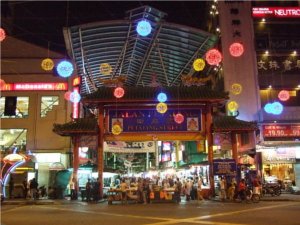
Food
Malaysia has many kinds of restaurants almost everywhere in the cities and towns. There are Malay Restaurants, Chinese restaurants, Indian Restaurants, Thai Restaurants and more. Eating out in Malaysia is a real gastronomic adventure. There is such a great variety; spicy Malay Food, a seemingly endless variety of Chinese food, exotic cuisine from North and South India, as well as Nyonya and Portuguese Food. Popular Malaysian dishes include satay, nasi lemak, rendang, roti canai, murtabak, laksa, chicken rice, and fried noodles. Western cuisine is also easily available. In addition, international fast food chains operate in major towns side by side with thousands of road side stalls and food bazaars.
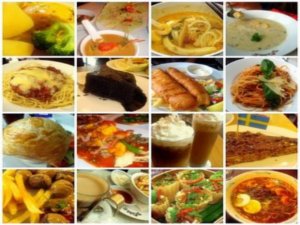
Other Information
Work / Employment
Although an International student on student pass have few opportunities to undertake paid employment, limitations placed upon them by the Malaysian Immigration Department makes it almost not possible to undertake any form of employment whilst studying in Malaysia. Please refers to the campus or International Student Handbook for more details.
Other useful links include the following:
Arrival Procedures
Please inform us of your flight arrival details (flight number, date and time) at the Kuala Lumpur International Airport (KLIA) or KLIA 2or Subang Airport (SZB) at least one week (7 days) before arrival.
The Malaysian Immigration Department requires the College’s staff to escort students through the passport control desk, otherwise students are not allowed to come out.
Non-notification will result that students have to wait for until college’s staff to come at the airport. If this happens over a weekend or public holiday, there may be no staff available until the next working day. In such cases you may need to stay in the KLIA transit hotel located in the satellite terminal. KLIA is located about 70km from the campus. The LCC Terminal is an additional 20 km away.
Upon arrival at FTMS College, our International student officer will collects the passports for endorsement by the Malaysian Immigration Department. Endorsement involves issuance of a one-year multiple entry sticker in the passport. Endorsement takes up to four (4) weeks, during which time students are requested not to make any travel plans out of Malaysia. In the meantime FTMS College will issue an official identification documents to students. Please ensure that your passport has more than three blank page and is valid for more than one (1) year from the intake date.
Check Also :
Penalties Exist For Expired Visa
- Overstaying is a serious offence under Malaysian law and can result in imprisonment and deportation. Compound fines for overstaying Student Passes is RM1,000 and increases for repeat offences.
- In addition FTMS also imposes fines up to RM1,000 to cover emergency administrative paperwork and manpower to solve cases.
- Students are referred to FTMS College’s Rules & Regulations governing their academic rights and obligations during their tenure of study in FTMS College.









